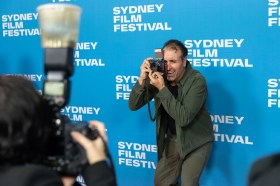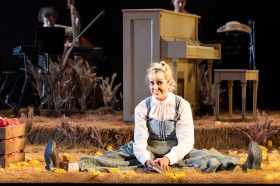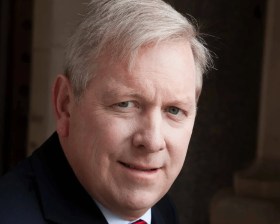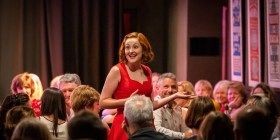Last year I was part of the team that delivered the Australia Council for the Arts’ national arts and cultural industry consultation, Re-imagine: what next?, looking at what kind of industry we want by 2030, and how to get there. On 26 May 2021, the Australia Council released its summary of our findings.
There’s a lot to unpack in the Re-imagine: what next? report, but for now, I have attempted to ‘summarise the summary’.
Throughout more than 100 hours of consultation and 1.3 million words of transcripts and submissions, 800 arts practitioners and industry professionals were strident and pretty much unanimous in their answer.
How do we want the industry to look in 2030?
Like the Australian population.
The consultation findings were unequivocal. Artists and arts workers want the industry to go beyond ‘diversity’ and ‘inclusion.’ The industry wants equity and justice for artists from First Nations communities and all racial and cultural backgrounds, gender identities, ages, disabilities, locations, and economic status.
Artists and arts professionals also want the industry to centre artists. This means a living wage for artists, and funding artists and communities rather than institutions or one-off projects. At the same time, artists want the industry to both create and communicate its public value.
How do we get there?
By finding more ways to raise money, shifting existing money and power to be equitable and just, and by creating and communicating genuine public value.
This means shifting investment away from large, Euro-centric organisations and artforms and towards practitioners and audiences from non-white, non-privileged backgrounds. Artists and arts professionals called for the industry to introduce quotas, industry standards and to tie funding to levels of equity and access.
Everyone knows money is finite, so practitioners also suggested impact investment funds and collective action to support artists and communities.
Many arts professionals also want to take art to the public rather than expecting the public to come to the art. This includes ideas such as library partnerships, community street festivals, and aged care and healthcare interventions.
A national plan
Last week A New Approach released its first analysis paper, Imagining 2030: Preparing for a National Arts, Culture and Creativity Plan. The report calls for a National Arts, Culture and Creativity Plan, learning from other plans including the Federal Government’s National Sport Plan, Sport 2030.
I had a look at ‘Sport 2030’ and I reckon you could do a find and replace for ‘sport’, substitute ‘art and culture,’ and you would have a halfway decent cultural strategy for the nation.
For example, Sport 2030 has five target outcomes: improving Australians’ health (physical and mental), growing Australians’ personal development, strengthening communities and growing the economy. In this way, Sport 2030 squarely places sport in its social context and articulates its contribution to the wellbeing of Australian society as a whole.
Sport 2030 also has five principles which, given the results of the Re-imagine consultation, I think would look right at home in an arts and cultural plan: universal, life-long accessibility; diversity; leadership; collaboration and partnership; and accountability.
Read: Imagining 2030: A New Approach sets the horizon on a national cultural policy
Perhaps the best lesson that the arts and cultural industry can draw from ‘Sport 2030’ is the expanded definition of sport to include physical activity. When the Federal Government talks about sport, it is no longer only talking about high performance activity, but informal activities ranging from yoga to ‘“ninja” style obstacle courses and stand-up paddle boarding.’ In the same way, A New Approach’s research recommends that ‘the arts’ be broadened to ‘art and culture’ to be more meaningful to more Australians, a point also borne out by the ‘Re-imagine’ consultation.
What next?
Now that the arts industry has re-imagined ‘what next,’ what actually comes next? The consultation findings were clear. The industry needs transformation. First steps towards the vision for the industry in the 2030 include:
- Linking funding to quotas for artists and audiences from all backgrounds, similar to the British Film Institute’s mandatory funding standards
- Subsidising industry funds to cover things like portable long-service leave or carers leave
- Incentivising social impact investment for long-term arts sustainability
- Forming a collective industry voice and building a public health message for arts participation
What can I do?
Presumably the Federal Government will announce actions in response to ‘Re-imagine: what next?’ But you don’t have to wait for government to write a plan before you start creating the industry you want to see by 2030. For example you could:
- Lobby local councils to introduce levies and stipends to incentivise artists to live in their towns
- Establish micro-financing funds for arts activity
- Encourage philanthropists to support the arts and their own portfolios through property investment
- Contact a local aged-care home to establish artist residencies and other types of partnerships
- Encourage private health insurers to offer rebates on arts participation
- Work with mental health providers to add creativity prescription to their toolkit
- Unite in a coherent voice to government and other industries
- Become leaders in climate responsible touring models
- Activate your arts industry ‘ex-pat’ mates in other industries like sleeper cells to advocate for arts partnerships
- Instead of lagging other industries, demand that arts organisations become leaders in equitable leadership, cultural safety and accessibility
In one of the consultation sessions I ran, a participant suggested that each person pick one thing from all the ideas that were being shared, and act on it. That way we will not just be planning the future that we want. We will be living it.






